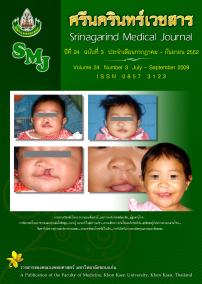ThaiScience
ThaiScience
SRINAGARIND MEDICAL JOURNAL
Volume 35, No. 06, Month NOVEMBER, Year 2020, Pages 687 - 693
Factors affecting distance of 6-minute walk test in post cardiovascular surgery patients after discharge at queen sirikit heart center of the northeast
Montri Yasud, Benja Songsaengrit, Pajeemas Kittipanya-ngam
Abstract Download PDF
Background and objective: The 6-minute walk test (6MWT) is a popular, practical and straightforward test that widely used to guide a cardiac rehabilitation program and assess exercise tolerance, therapeutic effect and prognosis. 6-minute walk distance (6MWD) varies with different factors. This research aimed to study the factors that affect 6MWD in post-cardiovascular surgery patients after discharge at Queen Sirikit Heart Center of the Northeast. Methods: Data and attractive factors collected from the medical records of the post-cardiovascular surgery patients during their first follow-up after discharge from Queen Sirikit Heart Center of the Northeast from May 1st, 2017 to April 30th, 2018. The statistical analysis applied to mean, standard deviation, correlation coefficient and stepwise multiple regression analysis. Results: 6MWD mean of 153 subjects was 276.05 ± 74.43 meters. The factors that relate to 6MWD are sex, height, maximum heart rate in the 6MWT, and the rate of perceived exertion before 6MWT. The shared factors in the prediction of 6MWD (r2 = 0.288, p < 0.001) are age, sex, and the rate of perceived exertion before 6MWT. Conclusions: The affected factors that could predict 6MWD in post cardiovascular surgery patients discharged from Queen Sirikit Heart Center of the Northeast are age, sex, and the rate of perceived exertion before 6MWT.
Keywords
Six-minute walk test 6MWT Cardiac surgery Cardiac rehabilitationSRINAGARIND MEDICAL JOURNAL
Published by : Faculty of Medicine, Khon Kaen University
Contributions welcome at : http://www.smj.ejnal.com/e-journal/journal/index.php
